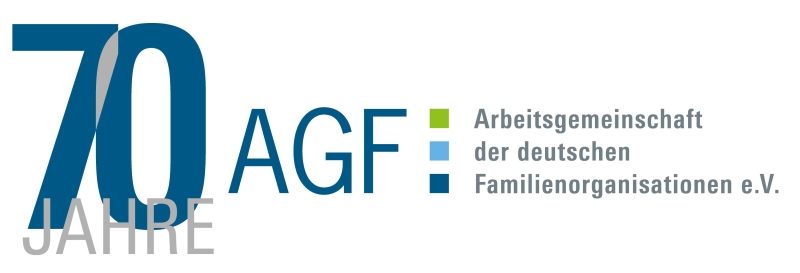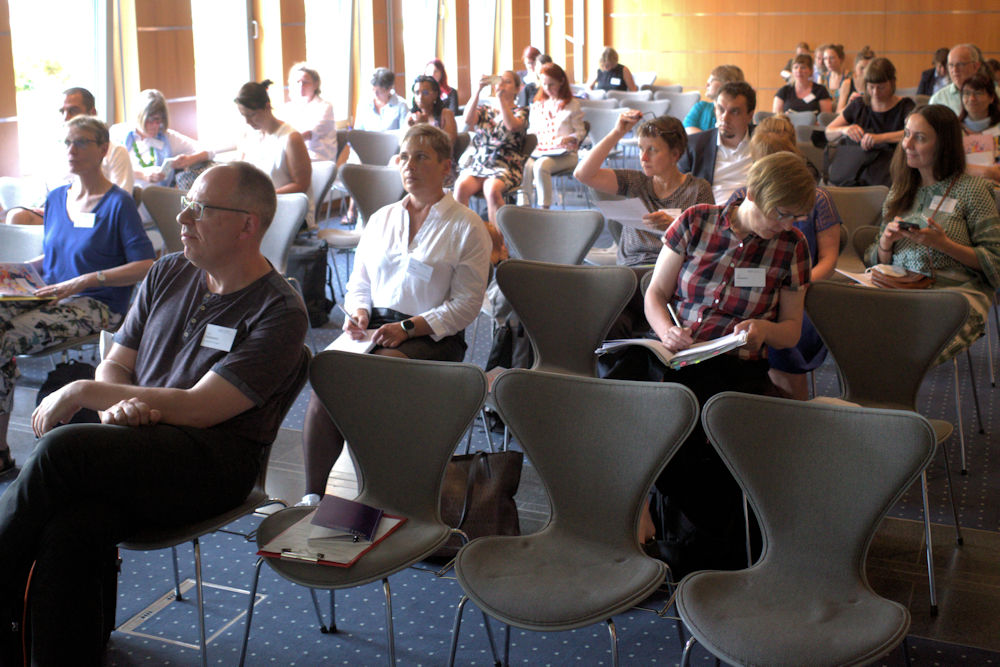On 24 June 2022, the AGF held a conference in Berlin on the federal government’s plans for family policy in the current legislative period. In the first part of the event, the guidelines of the Federal Government’s family policy were presented by the Parliamentary State Secretary, Mrs. Ekin Deligöz. In the second part, two topical initiatives on time policy were commented on by Stefan Reuyß (SowiTra) and Frank Schumann (Bundesverband wir pflegen): the reform of the parental allowance and parental leave and the revision of the two laws on carers leave and family care leave.
Part One: Family policy in the current legislative period
Contribution by Ekin Deligöz

Ekin Deligöz first briefly reported that she had just come from the Bundestag (parliament), where the vote to abolish section 219a (prohibition of advertising medical services for abortion) took place. She deemed this a historic decision and a step towards increasing the informed self-determination of women.
She introduced her talk with some of her personal experiences as a child when she immigrated to Germany from Turkey with her parents. She emphasised the outstanding importance of education for the social inclusion of children with and without experiences of migration. She then outlined the current family policy challenges and the measures planned by the Federal Government to meet them. She said that the upbringing of children, their financial situation and the provision of equal opportunities for all is not a purely private matter but is the responsibility of society.
She explained the planned changes in personal status law. Among other things, it is planned to abolish the transsexual law and replace it with a self-determination law. Furthermore, parenthood in a marriage between two women will receive a boost. If a child is born into such a marriage, both women should automatically become legal mothers of the child. This amounts to the abolition of the existing unequal treatment of same-sex marriages as compared with marriages between a man and a woman. Negotiations on these changes are already underway. On the other hand, discussion on a new law establishing a new legal regime for partners in a couple relationship that would complement marriage is still in its infancy.
With regard to measures that can be subsumed under the family policy triad of time, money and infrastructure, she reported that the “Good Childcare Act” will be further developed. The focus will be on the quality of day-care facilities. She stressed that the implementation of all-day care for children of primary school age is yielding a variety of solutions owing to the different paths already taken in the Länder. She reminded the Länder to make use of federal funds without delay and to act expeditiously to implement the expansion and the quality of the services.
The Family Ministry is already developing concepts for the further development of the Act on Caregiver Leave and Family Caregiver Leave. The main aim is to support carers and relatives by introducing a wage replacement benefit when carers reduce their working hours.
With regard to reforming the parental allowance, the Family Ministry plans to simplify the application process and reduce bureaucracy. Overall, she emphasised that shared parental responsibility will stepped up by, inter alia, the introduction of two-week paid paternity leave after the birth of a child. In the case of premature births, the plan is for the maximum parental leave to be extended.
Mrs. Deligöz highlighted that the work on a new basic child allowance has already begun. Interministerial working groups have been formed and she expects that key points for the coming year will emerge. The aim is to simplify the benefits for children in need and to make the first payments to parents based on the new concept before the end of this legislative period. However, arriving at a basic child allowance, which also involves recalculating the minimum subsistence level for children, is a huge challenge.
Discussion
In the plenary discussion after the presentation, questions were asked about measures taken by the federal government to overcome the consequences of the COVID-19 pandemic for children and young people. Mrs. Deligöz drew attention to the action programme “Catching up after the Pandemic for Children and Young People” and the additional opportunities to apply for funding.
She added that implementing the right to all-day care at primary school age was also an important step towards overcoming the consequences of the pandemic. Many children who had suffered from COVID-19-related learning deficits and limited social contact could particularly benefit from all-day services. She stressed that the Länder must apply for the available funds in order to make rapid progress in expanding and improving the services.
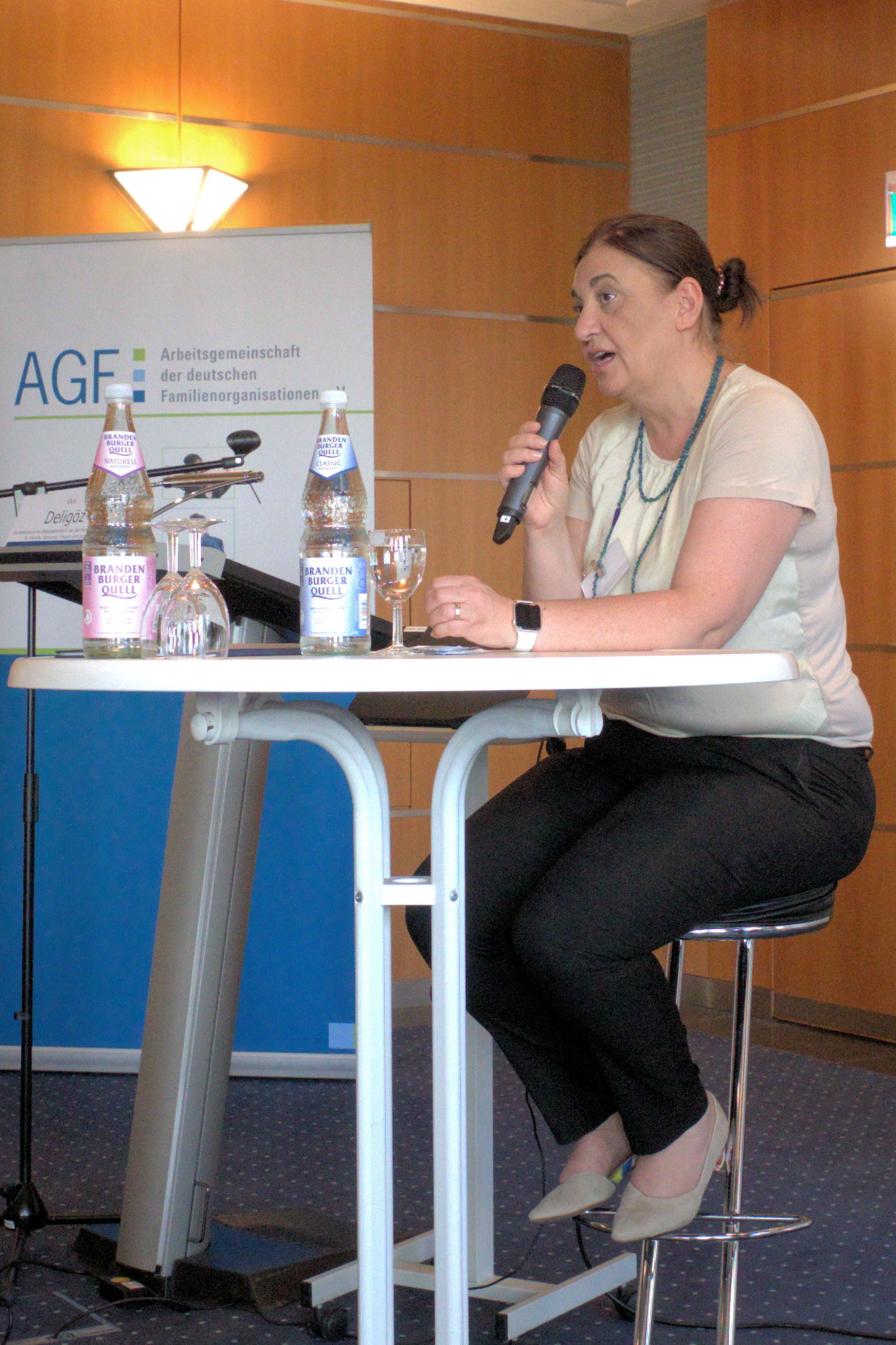
The issue of a fair division of care work between the genders also falls under the heading of the consequences of COVID-19. It was true, she said, that, in the first six months of the pandemic, a more gender-equitable division of domestic and child care pertained in parts of the population. In the longer term, however, the more traditional division of labour resurfaced. To deal with this, the further development of parental leave and parental allowance and the introduction of “fathers’ days” around the birth of a child would be starting points for promoting gender equality, as would the further development of gender budgeting, which should provide a better assessment of financial policy measures for gender equality and planning in the future.
Furthermore, Ekin Deligöz emphasised that the Minister was giving a lot of attention to the situation of single and separated parents. However, financial measures to improve their situation usually had to be coordinated with the Ministry of Finance. This was true, for example, in relation to issues such as a tax discount to cater for additional needs when both parents took on an equal share of child care after separation.
She also pointed out that the new process on reforming paragraph VIII of the social law (“SGB VIII”) had already started. There were also plans for the new paid family care leave, but funding had not yet been negotiated. In-depth discussion in cooperation with the Ministry of Labour and Social Affairs (BMAS) and the Ministry of Health (BMG) was still necessary.
Ms Deligöz ended with a call to organisations to support the Family Ministry’s plans with their own demands. Owing to the strain on the budget caused by the COVID-19 pandemic and the new priorities resulting from the “change of direction” caused by the war, family policy services were competing very strongly with other goals. The associations must bring their demands to the fore.
Part Two: Time policy measures
In the second part of the event, the time policy measures that had been announced by the coalition were the focus of the debate, generating comments from the point of view of science and of the carers.
Time for parents: possible future design of parental allowance/ parental leave
Stefan Reuyß from the Institute for Social Science Transfer (SowiTra) presented the results of the study “Proposals for Reform of the Parental Allowance”, which he had published two weeks earlier with his colleagues Svenja Pfahl and Maike Wittmann. The focus was on formulating measures based on four different normative objectives for reform of the current parental allowance. These four goals were “more equal partnership”, “greater inclusion of fathers”, “social fairness” and “crisis-proof parental allowance”.
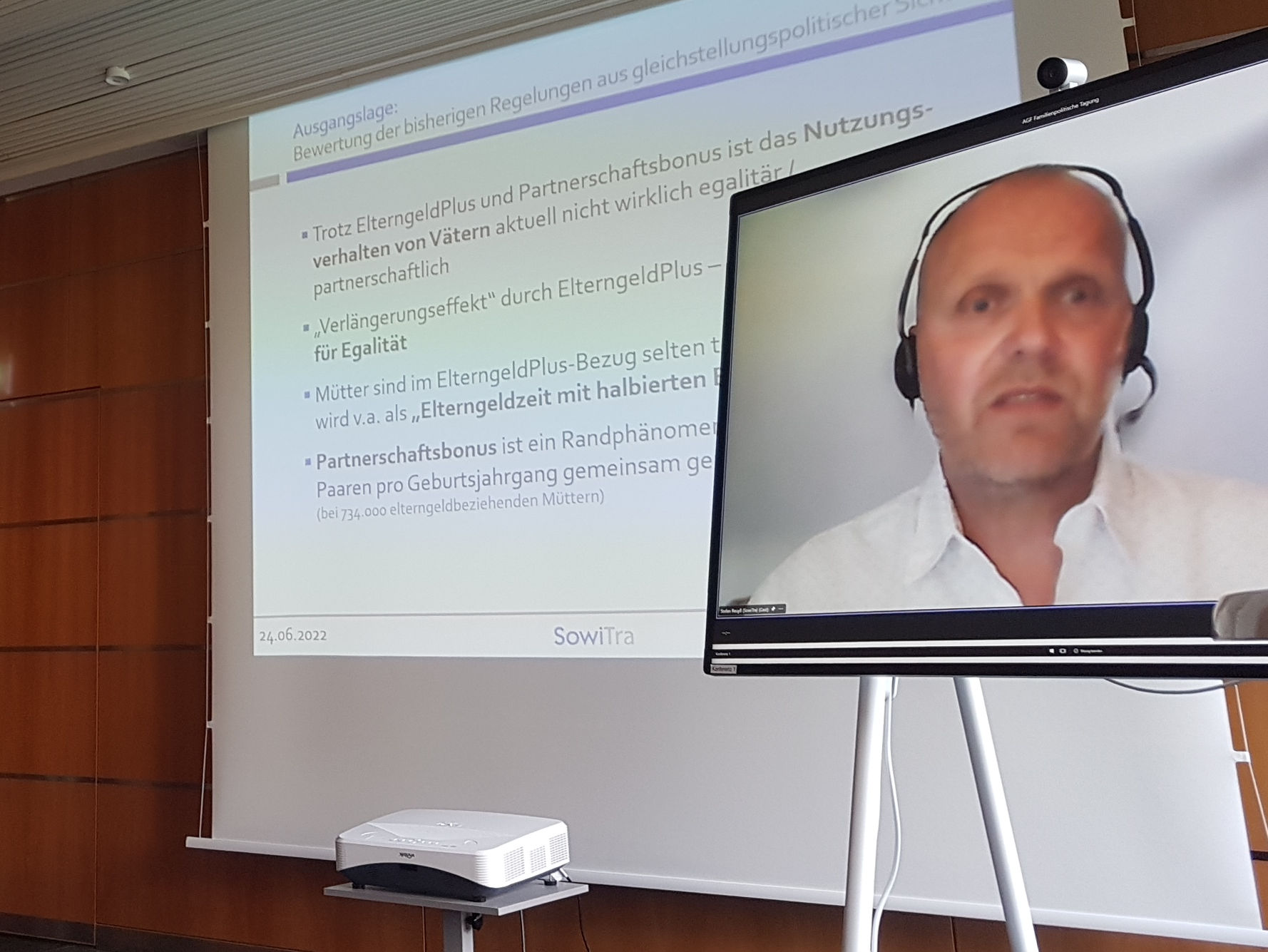
In the discussion, reference was made, among other things, to specific groups to whom the current parental allowance regulations do not offer satisfactory solutions, for example fathers (or mothers) after separation who would like to take parental leave with another child in their subsequent family. This means that a share of income is lost, which could lead to a loss of maintenance for the child from the first partnership. The fathers (or mothers) would thus be faced with deciding between accumulating debts because of the advance on maintenance payments or forgoing parental leave with the second child. Parents of chronically ill children were also finding that the available time off did not cover the need.
Herr Reuyß pointed out the great differences between the wishes of couples regarding working hours and the division of labour within the family before they become parents compared to their real-life models after becoming parents. The couples’ wishes before becoming parents included a much more equal division of work than the reality afforded. More partnership in parenthood could only be achieved if the ideas of normality in the world of work were more closely adapted to the wishes of couples. Parental allowance could be merely a building block in this process.
A new family care time
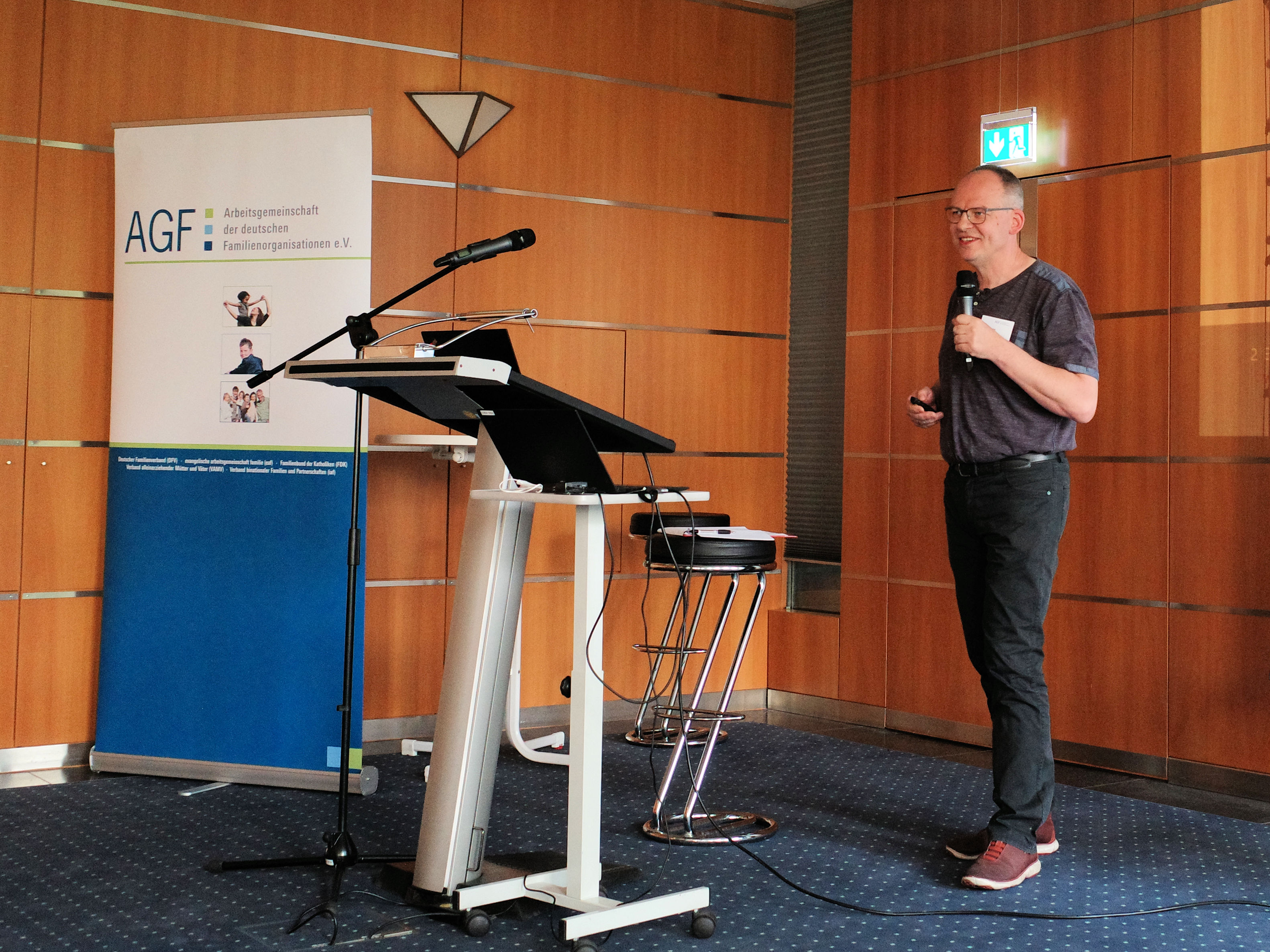
Frank Schumann from the Bundesverband wir pflegen e.V. (We Care Federal Association) spoke about the need for further development of the Carer Leave and Family Caregiver Leave Acts from the perspective of the independent advisory board for the reconciliation of care and professional work and at the same time from the perspective of carers. Given the great importance of family care work in Germany and the resulting burden on carers, he presented aspects that a new Family Care Leave Act would have to take into account in order to achieve more successful reconciliation of care and work.
Mr. Schumann’s presentation can be found here (in German):
In the discussion, Mr. Schumann pointed out that the members of the “independent advisory board for the reconciliation of care and professional work” are forbidden to disclose any results from the current second advisory council period until the report is published. The proposals presented therefore referred to the report of the first period. Accordingly, the topic of parents with children with high care and support needs could not be discussed in this conference. However, this was the subject of the second report, which was currently being prepared and which would be discussed at some later point.
Various participants emphasised that, in order to improve the situation of family caregivers, not only the family care leave period but above all the infrastructure that supports domestic care must be expanded and its quality improved. This applies to day and night care, as well as respite care, etc. At the same time, the quality of care services , the respect for the self-determination of those in need of care and the prevention of violence must be prominent in domestic care.
There was also a suggestion that the Advisory Council look at the situation of people with a migration history who have parents in need of care abroad. Germany is making efforts worldwide to attract qualified workers to work in Germany. However, these skilled workers also have parents who may increasingly require help and care as they age. For this group, too, opportunities had to be created to manage work and transnational care and support
At the end of the event, Sven Iversen referred to the European Care Strategy that is currently being developed. It is important to ensure that the European level serves as a stage for actions to improve the situation of caring relatives
